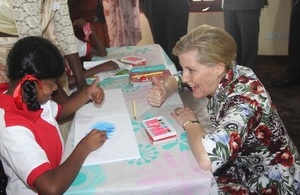The Earl and Countess of Wessex visit the Mentally Disabled Children and Families Project
His Royal Highness Prince Edward, The Earl of Wessex, and Her Royal Highness The Countess of Wessex, visited the Mentally Disabled Children and Families Project (MENCAFEP) during their recent visit to Sri Lanka.

Her Royal Highness The Countess of Wessex with a student from the Mentally Disabled Children and Families Project.
The Royal couple spoke with students and their parents to understand how the project is helping children with disabilities integrate into society and reach their full potential.
During their visit to the centre in Nuwara Eliya, Their Royal Highnesses heard from founders Ranji and Chris Stubbs how the project, which began in 1988 with 6 children and their families, is now working with over 3000 children and their families today. MENCAFEP is present in 3 districts, Nuwara Eliya, Batticaloa and Killinochchi.
Ruwan, a young man who was educated at MENCAFEP and is Chair of the MENCAFEP Children’s and Young Persons Group, said:
For The Earl and Countess of Wessex to visit MENCAFEP and meet and talk to the children and young people at our school has given us loads of respect and pride in the MENCAFEP community.
Thusitha Amarasinha, Secretary of the MENCAFEP Parents Committee said:
The Royal visit to MENCAFEP is a great blessing to all of us here, and an important event in our history. The Earl and Countess of Wessex’s visit creates awareness of what MENCAFEP is doing for our children. It also gives us hope and the strength to build a future for MENCAFEP.
MENCAFEP began 30 years ago when Ranji and Chris Stubbs were working helping unemployed young women in Nuwara Eliya to find work. They found that there were many disabled children who were being left neglected because their parents did not know how to care for them. In many cases learning-disabled children were simply being left in isolation. Ranji and Chris decided to start a day-care school and centre where these children would be looked after, and where the unemployed women in the area could work with them. During MENCAFEP’s years of service they have worked with over 8000 children and their families.
In addition to providing an education for disabled children, MENCAFEP also works with families and communities to counter stigma around mental disability, and it educates staff from government agencies and civil society in effective care-giving techniques.